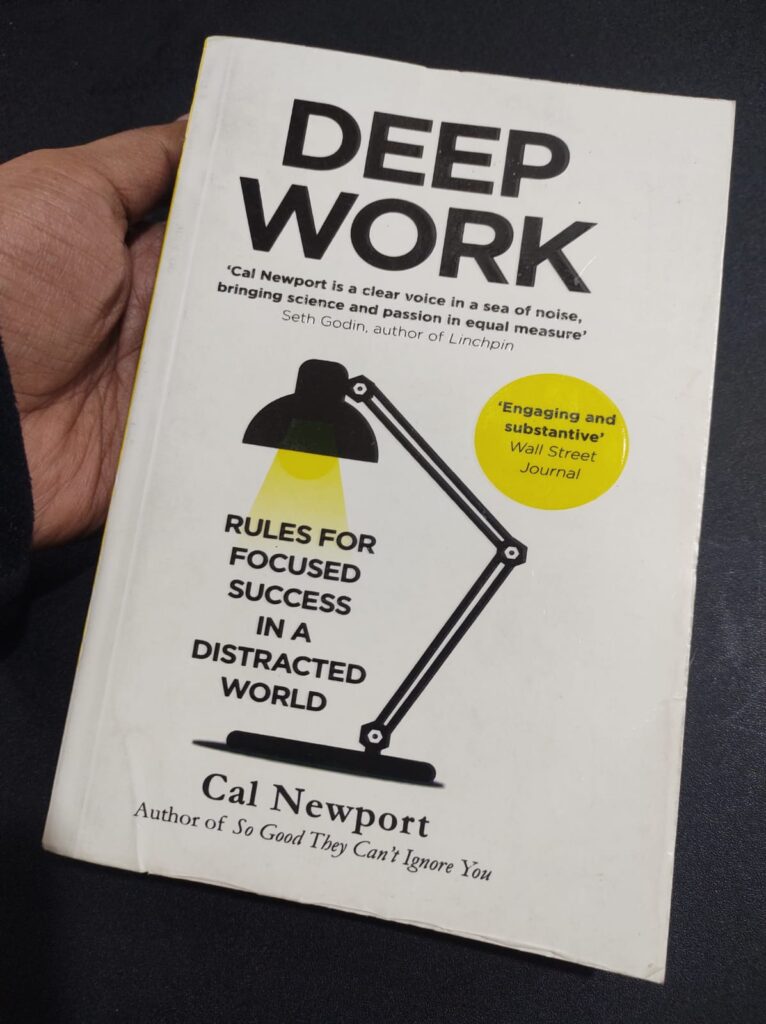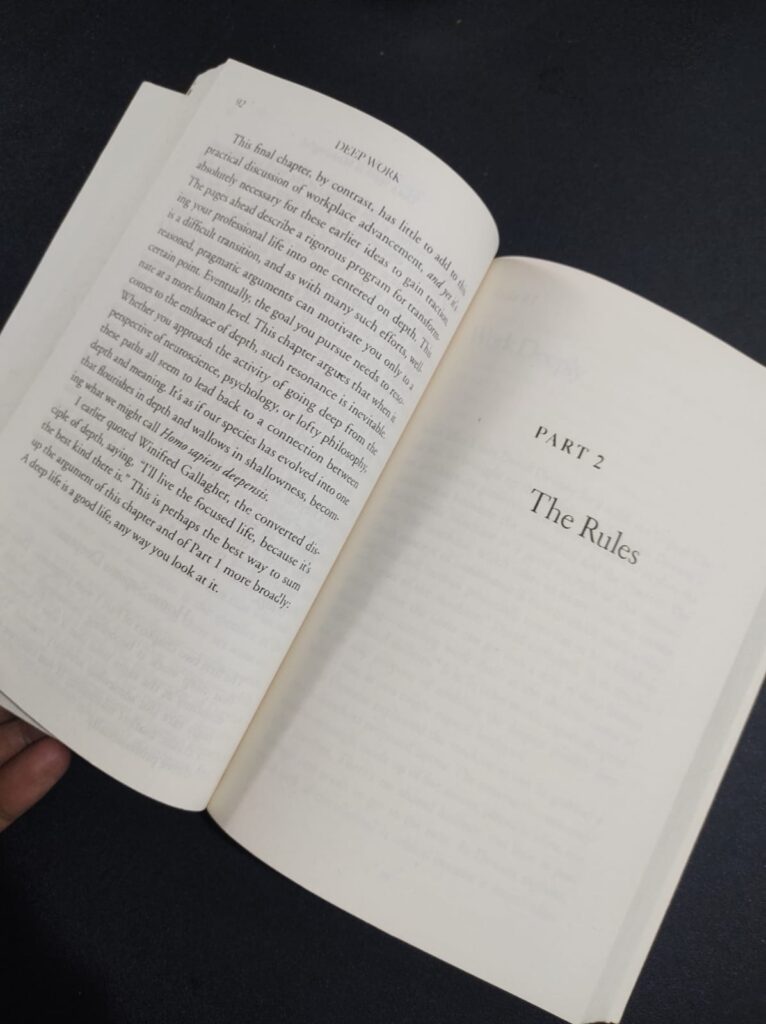You know that feeling when you feel like something is not going right, but cannot pin point what exactly is wrong. Well, that is how I felt after I got my promotion. I was expected to do more, participate more, but not exactly related to what I was doing at my previous designation. I was expected to participate in the managerial decisions. I felt confused. I thought to myself, why am I not exactly happy with my promotion? Isn’t this what I want? To have more authority to make the right decisions? Isn’t this the direction I want to take my career to? Isn’t this the next step?

When you face such kind of doubtful situations, if you are a logical person, you try to find a solution for the problem. In my case, the solution was right in front of my eyes. Deep Work by Cal Newport. I had it for many months now. But I think there was not a better time to pick this book up. As I read through the introduction of the book, one thing was clear that this is going to be an interesting read. I was clueless at that time that this is exactly what I was looking for.
Cal Newport introduces this theory of Deep Work in his book. In my words, I will explain it as, being so focused while working, that you reap extra rewards out of it. Cal also discusses how practicing deep work on a regular basis can enhance your cognitive ability. As you keep on doing more deep work, it keeps on adding to your ability to do more.
But Deep work is not as easily done as said. Especially in today’s world, where you have so many distractions at the tip of your fingers. Yes, I am talking about your phones. Cal confronts internet in general for bringing in so many distractions in our day, so that many people lose focus of what is important. For a knowledge worker, working in an open office, these distractions come in the form of emails, reminders, notifications, surrounding chit chats, what all and what not. If you indulge in these distractions for a long time, you will start
thinking that they are more important than the actual work you need to do.
I see this around me all the time. For many senior position knowledge workers, emails, meetings, delegating and contact building has become more important than the actual groundwork. For many youngsters coming into the industry, social media and coffee point chit-chats are more important than their actual work. Seeing people around me so distracted, frustrates me to a level I cannot explain. When I am travelling in a metro, and I see everyone around me so lost in their phone. When my colleagues spend most of their time just talking about big things but not taking out time to plan out a successful way to actually implement those things. When I see my juniors taking out their phones the moment they get a chance. It’s really hard for me to accept this reality to be honest. And then to add a cherry on the top, they think that what they are doing is crucial. Or they are entitled to the liberty of using their phones during work hours. I cannot understand it.
Enough whining, the point is, I and Cal somewhere share the same perspective about deep work. When I go to office, I want to work with the whole of my concentration. Do as much as I can. Think and apply and get results. As an architect, to be honest, I am more inclined towards the technicalities of design and execution than the poetic and artistic point of view of design. I like thinking deeply and bringing the best solution on the table. Not just talks, but a well thought of plan. Coffee breaks seem like a waste of time to me. I am not interested in chit chats. I keep all the notifications off on my phone. I keep my phone in my bag throughout office hours. I don’t check messages and mails when I am working. I enjoy extending after office hours just for the peace of not having anyone bug me while working. Don’t take me wrong, I would like to mention that I have a fantastic team of hard-working individuals. But as many of them are early on in their career, they have doubts. A lot of them. And it is my job to answer them. I am open to questions though. That is what I tell them and I really am. I want them to learn and grow. I want them to learn the right way of doing things. And I welcome their questions. But along with that, I crave for some me time where I can completely focus on my work. Just me, my computer and a problem to solve. It relieves me. I feel content when I find a solution to a hard problem. You can call me a workaholic. Sometimes, not in a good way. That’s my dopamine.
But believe me, I am able to do more with this attitude. As Cal says, people won’t mind if you don’t reply to their messages and mails instantaneously if you are giving them actual results. They will get used to it after some time. And I witnessed it myself. My colleagues don’t mind. They understand that I must be doing something important. I got a double promotion in a single year. I created the basic training program for my company along with my other work responsibilities. I usually excel at the task given to me (As long as it does not involve mails and proposals and talks). What I can do, most of the others around me cannot. And I am valued for that. And this is the point Cal wants to make in his book. Deep work is becoming more and more rare with the increasing distractions around us. And those who will practice deep work will get rewarded. He provides many strategies in his book to practice deep work. To create an environment and generate habits to help you work deeply. A person who is new to the concept of deep work, and wants to practice it for the first time, will find this book very useful. It can help you overcome the distractions and reach your full potential.

But as I was already practicing deep work, knew its effectiveness, and trusted its ability, I found Cal’s book very useful to find direction for my career. I always thought that we start as a junior level knowledge worker, then become a team lead and then enter the managerial stage where we don’t do the actual work, but help others do more. After reading Deep Work, I found out that I enjoy the actual groundwork I do, not the managerial stuff most companies do. And the managerial work, in reality, does not mean not working yourself, and just making others do more. Managerial work is much more. It needs deeper cognitive skills, and much more than simply exchanging emails. But many workplaces don’t actually understand that. I am not interested in creating proposals as long as they are not well detailed execution plans. I am not interested in estimating the time frame of a project until I get all the details of the project, until I create a well thought of work breakdown structure, and understand the uniqueness of the project requirement. I want to be certain with what I do. And I truly believe that when you do things this way, think it through, assess the risks, and create a workable plan, you get actual things done. And doing such work takes time.
After reading Cal’s book, I am clearer about my career aspirations. No doubt, managerial stage will be a step up for me. But I want to work in an environment where managerial work also means deep work. Where I am provided enough time to think things through. I am as interested in managing a project as much as I am in drawing production, as long as I get an environment where people understand the crucial aspects of it. And without a doubt, I am not interested in doing shallow work. This book gave me the confidence to say a stern no to shallow work, even if it means taking a step back in my career. I am not going to give up my ability to do cognitive work. I am not going to give up my ability to do Deep Work for a step up in my career. I have a lot of things to offer, but only to those who understand the actual value of it.
I would like to conclude that Deep Work by Cal Newport is a must read for any professional in a knowledge industry. I would only suggest that if you do decide to read this book, make sure of two things. Acknowledge that you want to change your working style and adapt this new way of working. And read this book with an open mind.